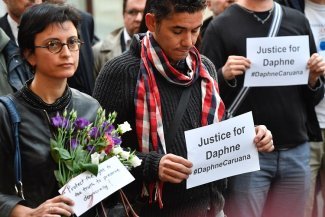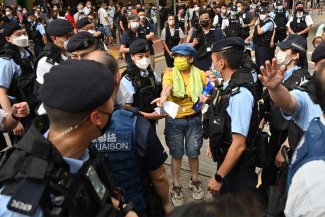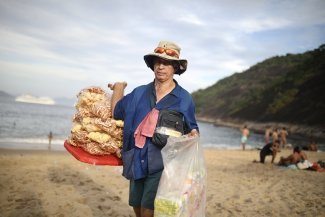Protesters on the streets of Tbilisi on 7 March 2023.
This is a real victory for the thousands of Georgians who took to the streets in early March to oppose the bill. After protests of historic proportions in the small Caucasus country, the ruling Georgian Dream - Democratic Georgia (KO-DS) party was forced to withdraw its law on ‘agents of foreign influence’ on 10 March 2023. Modelled on the Russian law of the same name, it required any organisation receiving more than 20 per cent of its funding from abroad to register as an ‘agent of foreign influence’ and its members to register as well, on pain of up to five years in prison. It also reportedly authorised the Ministry of Justice to investigate and request documents from these same organisations, including potentially sensitive personal data.
Within Georgia, the law has been nicknamed ‘Putin’s law’ or ‘the Russian law’ and its first reading on Tuesday 7 March 2023 plunged the country into an unprecedented protest movement with more than 30,000 demonstrators. It clearly targeted the few independent media, non-governmental organisations (NGOs), as well as trade unions that receive international donations.
“The government is trying to silence critical voices against it. And with this law, its aim is to weaken civil society,” explains Dachi Imedadze, co-founder of the NGO Shame Movement, which has been campaigning since 2019 for an overhaul of the electoral system in Georgia.
More broadly, civil society feared that this law would become the legislative means to stifle any voice of opposition to the government, including through the adoption of increasingly repressive amendments that would have threatened the existence of NGOs and the media. “In the long term, we would have seen the same scenario as in Russia: organisations eventually closing their doors and going into exile. The term ‘foreign agent’ has a very negative connotation in our region; it’s almost like being labelled a traitor. Moreover, the law contained vague sections that would have left the government room for interpretation,” says Mariam Nikuradze, a journalist and co-founder of the independent media Open Caucasus Media (OC Media), which covers news from the Caucasus with an emphasis on long-form and investigative reporting.
The organisations were also concerned that the future law would jeopardise their relationship with foreign donors, threatening their main source of funding. “Financial support from friendly countries - and the free legal assistance provided by civil society organisations funded by this money - has been essential in enabling us to fight labour rights violations in the courts and bring them to the attention of the labour inspectorate. Legal services are expensive and not particularly accessible to people who have been dismissed. [...] Well-funded and courageous legal aid organisations play a vital role in helping employees to challenge the state, political power and the massive financial resources of the private sector. Without the support of foreign donors, we would be on our own in confronting these powerful forces,” reads a statement from the Georgia Fair Labour Platform, a coalition of independent unions working to improve working conditions in the country.
A weakened civil society
This is especially true given the increasing number of attacks on democracy in recent years, which has already weakened civil society. In 2021, a data leak revealed that the State Security Service was conducting massive surveillance and wiretapping of civil society activists. During demonstrations, law enforcement agencies appeared to have specific instructions to arrest NGO members. For example, in May 2022, the director of the NGO Shame Movement, Giorgi Mjavanadze, was arrested after organising a rally in support of Ukraine on the grounds that he had disturbed public order.
Summoned to the police station, he was beaten for several hours on the floor and threatened with rape. “It was traumatic and violent. But this arrest goes beyond my personal case and exposes the systemic nature of the crimes of the police, who have specific instructions about activists. We feel we have no privacy. I know someone can monitor my calls all the time,” he told Equal Times. “The situation is already complicated, but to label us as foreign agents is to legitimise the violence because we would be seen as enemies of the country,” adds Imedadze.
As their work faces increasing obstacles, NGOs are worried the situation may reach a point of no return, as the co-founder of the Shame Movement points out: “The government will continue to act in an authoritarian manner, which is why we must remain extremely vigilant.”
In a country where the media landscape is polarised and owned by those close to the politicians, the rare independent media such as OC Media, Netgazeti, or Batumelebi, are also the target of repeated attacks. Under the guise of fighting disinformation, legislation has become tougher. “The deterioration of our democracy did not start today. As far as the media is concerned, the most important turning point was on 5 July 2021, during the Pride March: 56 journalists were injured on that day and one of them died shortly afterwards. The organisers have still not been punished and the government has been demonising the media ever since,” says Nikuradze.
The journalists are critical of the government for creating a climate of mistrust, and denounce the lack of serious investigation when crimes are committed against their colleagues in the country. “First, we were worried about our safety, now about freedom of expression and our very existence. At one point, we considered changing the registration of our organisation to another country in case the law was passed,” says the OC Media journalist.
The government’s position
Georgia had not seen such a protest movement since 2019. The law was introduced by Power to the People (khalkhis dzala), a group of MPs who left the ranks of the ruling Georgian Dream party, in power since 2012, in August 2022, with its support. Since then, it has been the extreme voice of the party, the spokespeople of its anti-Western and pro-Russian hard line. Despite the withdrawal of the law, the political majority has not changed its position: “The lie machine was able to present the bill in a negative light and mislead a certain part of the public,” the party declared after the withdrawal of the law, before affirming that it would not give up on future similar legislation, planning public meetings to convince the population of its necessity when the “tensions” are eased.
This attitude continues to alarm civil society, while the political opposition accuses the government of Irakli Garibashvili, in office since 2021, of moving politically closer to Moscow, which has been even more marked since the start of the war in Ukraine, despite a largely pro-Ukrainian population. All the more so as Georgian Dream is directed behind the scenes by its founder, the billionaire oligarch Bidzina Ivanishvili, who was once prime minister and who maintains strong links with Russia where he made his fortune.
“This law is part of a process to overturn the last bastion of Georgia’s pro-Western orientation, which is public opinion,” says Thorniké Gordadzé, a researcher at the International Institute for Strategic Studies and former Georgian minister for European integration.
“The events the country has just experienced are unprecedented in Georgia’s history since independence. The current government has radically changed its geopolitical orientation with its rhetoric that the European Union would push Georgia into a war with its Russian neighbour. The government’s narrative is setting peace on the one hand in opposition to Georgia’s pro-European orientation on the other,” says the researcher.
In the country, the fear of a war with Russia remains strong. The memory of the Russian invasion in the summer of 2008 is still painful. After five days of a blitzkrieg, the country found itself cut off from the provinces of South Ossetia and Abkhazia, whose independence was recognised by Moscow. It traumatised the population, which fears that history will repeat itself.
“If we think back to the case of [former president Viktor] Yanukovych in Ukraine, we see that the pattern is the same - Russia is preventing the government from achieving tangible results for Georgia on the road to European integration,” says Helen Khoshtaria, founder of the opposition Droa party. Pointing to the lack of reforms, last June the European Union refused the country official candidate status, unlike Ukraine and Moldova.
“This is the first step to victory, but nothing is over yet. We have to bear in mind that the ruling party, which dominates Georgian politics, will not move away from Moscow because of a few demonstrations. What is needed is a profound political change in Georgia, so that the country can take the path to the European Union once and for all,” insists Khoshtaria.













